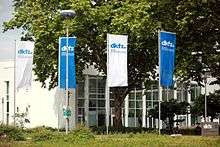German Cancer Research Center
The German Cancer Research Center (known as the Deutsches Krebsforschungszentrum or simply DKFZ in German and also known as the German Cancer Consortium), is a national cancer research center based in Heidelberg, Germany. It is a member of the Helmholtz Association of German Research Centres, the largest scientific organization in Germany.


History
The establishment of a national cancer research center in Germany was initiated by Heidelberg surgeon Professor Karl Heinrich Bauer. The DKFZ was set up in 1964 by resolution of the State government of Baden-Wuerttemberg as a foundation under public law. In 1975, the Center became a member of the Association of National Research Centers.
The AGF was transformed into the Hermann von Helmholtz Association of National Research Centers in 1995. The Center has also been a member of the Deutsche Forschungsgemeinschaft (DFG) since 1977.
Research
There are seven Research Programs at the DKFZ:
- Cell Biology and Tumor Biology
- Structural and Functional Genomics
- Cancer Risk Factors and Prevention
- Tumor Immunology
- Innovative Cancer Diagnostics and Therapy
- Infection and Cancer
- Translational Cancer Research
A Graduate and an undergraduate student program are present at the DKFZ.
Cooperation with other partners
A result of the successful cooperation of the German Cancer Research Center with other partners is the first new building for "The National Center for Tumor Diseases" (NCT) in Heidelberg. The project was commissioned by the German Cancer Aid with 29 Million Euro, as it was officially announced at the opening celebration on November 2, 2010, with Germany’s Minister of Health, Dr. Philipp Roesler (Berlin). The modern new building is located on the campus of Heidelberg University Hospitals.
The NCT is a joint project of Heidelberg University Hospitals, Thorax Clinic Heidelberg, the German Cancer Research Center (Deutsches Krebsforschungszentrum, DKFZ) and the German Cancer Aid, founded by the late "First Lady", doctor Mildred Scheel. “NCT’s new building offers ideal conditions for translating current research results into clinical practice,” said Professor Dr. Otmar Wiestler, DKFZ’s Scientific Director, at the opening. “Its two strong partners, the German Cancer Research Center and Heidelberg University Hospitals, provide the best basis for this.”
The German Cancer Consortium (DKTK) is a joint long-term initiative involving the German Federal Ministry of Education and Research (BMBF), participating in German states and the German Cancer Research Center (DKFZ). It was established as one of six German Health Research Centers (DZGs) in October 2012. More than 950 researchers work within the DKTK, along with support staff. Around 350 of them are employed via the DKFZ. An important task of the DKTK is promoting the next generation of researchers in the field of translational cancer research. For this reason, around 20 percent of all DKTK employees are postgraduate students. The DKTK is financed via an institutional funding model. Since 2014, the DKTK’s annual budget has been EUR 27.8 million (90/10 financing). The total budget for the first research period (2012–2015) was EUR 80.5 million.dktk website